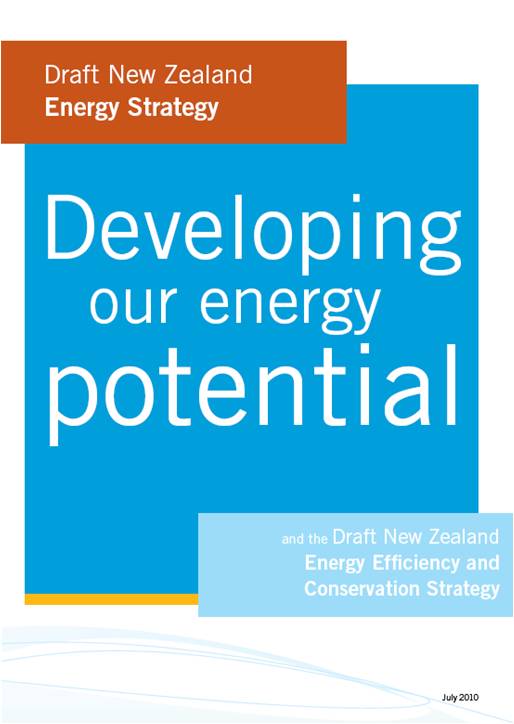 The government’s Developing our Energy Potential – Draft New Zealand Energy Strategy and Draft New Zealand Energy Efficiency and Conservation Strategy document has been open to public submissions for the last three months, with submissions due to close by tomorrow.
The government’s Developing our Energy Potential – Draft New Zealand Energy Strategy and Draft New Zealand Energy Efficiency and Conservation Strategy document has been open to public submissions for the last three months, with submissions due to close by tomorrow.
The strategy document fits energy within government’s stated goal of growing New Zealand’s economy. It sets out how government intends to do this (both with renewable and fossil fuel-generated energy) while still being environmentally responsible, and looks at supply, delivery and use of energy.
Among the priorities mentioned are the development of New Zealand’s petroleum and mineral resources, and the target that 90% of New Zealand’s electricity be generated renewably by 2025 (currently, 73% is generated from hydro, geothermal and wind resources).
But to what extent are the strategies realistic and achievable and have the correct energy priorities been identified?
The SMC gathered a panel to run the ruler over the document, and to see to what extent they’re realistic.
The document can be accessed on the MED website, here.
The speakers’ audio can be listened to below, and the slides are available to registered journalists in the SMC Resource Library.
Part I
[audio:https://www.sciencemediacentre.co.nz/wp-content/upload/2010/09/Draft-NZ-Energy-Strategy-Pt-I.mp3]Part II
[audio:https://www.sciencemediacentre.co.nz/wp-content/upload/2010/09/Draft-NZ-Energy-Strategy-Pt-II.mp3]SPEAKERS
Tim Davin: Tim is Director of Policy at IPENZ. He has engineering and Master of Public Policy degrees and is a Fellow of the Institution of Engineers NZ. Tim has worked in the local government, NGO and consulting sectors. At IPENZ he has worked on a range of technically related public policy issues, including the infrastructure sector.
In March 2010 IPENZ released a report, Electricity Generation – Achieving New Zealand’s objectives, which discusses the likelihood of New Zealand being able to achieve energy efficiency, renewables, emissions and security of supply objectives in the future.
Associate Professor Bob Lloyd: Bob is the Director of Energy Studies Programme at the Department of Physics, University of Otago. From Australia; he came to New Zealand in 2002 after having worked for the Australian Coo-operative Research Centre for Renewable Energy (ACRE), based at Murdoch University in Perth. He has also worked on renewable energy systems in China and the Pacific Islands and taught at the University of the South Pacific in Fiji.
His current research interests, at Otago University where he is the Director of Energy Studies and Associate Professor in the Physics Department, lie in energy conservation in residential housing and energy management including world energy resources and peak oil. His PhD from Flinders University in South Australia was completed in the field of experimental atomic physics.